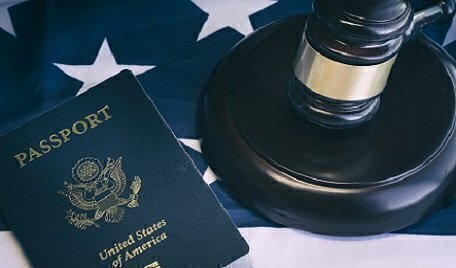Beginning its defense in a federal appeals court of the third version of President Trump’s attempt to block entry of foreign nationals from six Mideast nations, the Administration argued that the new restrictions have nothing to do with religion and are focused only on national security fears.
 In asking the U.S. Court of Appeals for the Fourth Circuit this weekend to put on hold a Maryland judge’s ruling blocking enforcement of the new presidential order, government lawyers asserted that the ruling threatens a permanent loss of presidential authority to protect the nation from harm by keeping out foreigners from countries posing the greatest danger of terrorism.
In asking the U.S. Court of Appeals for the Fourth Circuit this weekend to put on hold a Maryland judge’s ruling blocking enforcement of the new presidential order, government lawyers asserted that the ruling threatens a permanent loss of presidential authority to protect the nation from harm by keeping out foreigners from countries posing the greatest danger of terrorism.
The only way that the president can reclaim that authority, if the Maryland ruling is allowed to stand, is for the Chief Executive to issue a public and sincere disavowal of any intention to keep Muslims out of the country because of their religion, the new filing said. But, it added, it is not even clear just what kind of disavowal would be sufficient to satisfy the Maryland decision.
That argument was in direct response to the ruling last week by U.S. District Judge Theodore D. Chuang of Greenbelt, MD, that the third version of the immigration restrictions simply carries forward the president’s repeated desire to have a “Muslim ban” and that relying upon input from a number of government agencies into the latest version did not overcome that flaw.
The Administration’s new filing makes five basic points in trying to prove that the latest presidential order on immigration is not based on religious hostility:
First, the new order resulted from a global analysis of how 200 countries gather and share information about who among their citizens might pose a hazard to security in other countries.
Second, President Trump in approving the new order acted on the recommendation of government officials, none of whom “acted in bad faith or harbored anti-Muslim animus.”
Third, the new order as written is entirely free of any religious content, will be carried out without any religious influence, and is focused only on U.S. national security needs.
Fourth, it adds two non-Muslim countries to the list of those whose citizens would be denied entry as immigrants or as travelers: North Korea and Venezuela. It also takes off two Muslim nations who were on the list under earlier versions: Iraq and Sudan.
And, fifth, the new order is specifically tailored to the situation in each of the nations covered, and there are differences in the country-specific reasons for the entry restrictions.
Despite all that, the new government document said, Judge Chuang found that the way the new order was worked out could not cure any flaws in the President’s earlier orders, its religious bias in particular. The filing argued: “Under the district court’s approach, until the President issues a disavowal of sufficient (and unknowable) sincerity and force, he is unable to regulate immigration from Muslim-majority countries despite known and identified risks to our national security. That is not, and should not be, the law.”
If the Maryland judge’s bar to enforcement of the new executive order is not overturned, it “threatens to disable the President permanently from addressing immigration-related national-security risks in countries that pose the greatest concern,” the government lawyers contended.
Judge Chuang’s decision only blocks enforcement of the new order, and does so only for foreign nationals who lack any significant tie to the U.S., as to the six countries on the presidential list which have majority Muslim populations or major concentrations of Muslim residents. The order thus applies only to Chad, Iran, Libya, Syria, Somalia and Yemen, and does not apply to North Korea or Venezuela.
In addition to basing his enforcement ban on the finding of religious bias, the judge in Maryland found that the presidential order probably is illegal because federal immigration law does not allow a total ban on entry for all of the people from a given nation, based on where they live. The Trump order, the judge noted, would apply overall to more than 150 million people.
Administration lawyers asked the Fourth Circuit to put its review of Judge Chuang’s ruling on an expedited track that would have all of the written briefs filed by next Thursday. The groups challenging the new presidential order argued that the timetable proposed by the government allowed their lawyers too little time to prepare their responses.
The government also asked the Circuit Court to put Judge Chuang’s order on an immediate hold as it considers whether to block it for a lengthier period of time while it reviews the government’s appeal.
Meanwhile, a federal trial judge in Hawaii has also blocked enforcement of the new presidential order, finding it likely to be struck down as a violation of federal immigration law. District Judge Derrick K. Watson of Honolulu on Friday put his enforcement bar on a more lasting basis, thus clearing the way for the government to begin an appeal to the U.S. Court of Appeals for the Ninth Circuit.
Both of the two circuits where the challenges to the new Trump order are unfolding had decided earlier that the second version of the restrictions could not be enforced because it was either likely to be struck down as illegal under immigration law or under the Constitution. That second version has now been replaced by the third version.






